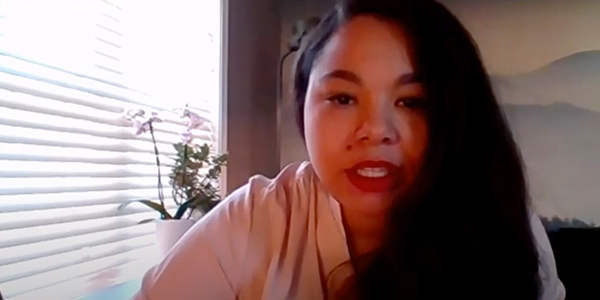2020 was the year when clean tech, like other business sectors across the country, was put on notice that talking about diversity in the workplace was not enough. The Black Lives Matter movement that erupted in the aftermath of the killing of George Floyd shifted the industry’s focus to action and impact, according to speakers at two recent panels on diversity, equity and inclusion (DEI) in renewable energy and clean tech.
For example, at the Atlantic Council’s March 8 webinar on bridging the gender gap in clean tech, Jennifer Holmgren, CEO of carbon capture and recycling firm LanzaTech, reported that the company has now reached gender parity in its major science teams and has an employee-driven DEI group.
“They did a questionnaire that was really eye-opening for us on how people felt in the company,” Holmgren said. “Nobody ever asks, ‘Are you feeling uncomfortable?’ Some of these [initiatives] don’t happen top down. They bubble up, and people get together and become conscious of the need to act.”
At wind developer Siemens Gamesa, Abby Watson leads the company’s North American government affairs efforts and was also recently named co-director of a new Diversity, Equity and Inclusion Council. “We’re not only looking at our workforce, but we are also looking at our supply chain,” Watson said during a DEI-themed session at the American Council on Renewable Energy’s Policy Forum on March 10. “We spend a lot of money, and we are looking at how we can spend more of that money with women- and minority-owned businesses.”
The session also served as an introduction to some of the first women- and minority-owned companies selected for ACORE’s Accelerate program. Launched in December, the initiative provides these organizations a two-year free membership in ACORE, plus other networking and pro bono services to help them grow their businesses.
Talking about the new program, Watson said, “Just providing information about opportunities is not enough. There are real barriers that women- and minority-owned businesses face that larger, more established businesses don’t, especially when you’re looking at becoming a supplier to a large, multinational, publicly traded corporation.”
Dana Clare Redden, founder and CEO of commercial and low-income solar developer Solar Stewards, was on both panels. Her company is among the first group selected for the Accelerate program. One of her key issues was ownership.
“Participation is great, a great place to start,” Redden said at the ACORE session. “But it’s really ownership that tips the scales, whether that be through entrepreneurship or even the ownership of those energy assets. To create this diverse workforce, one of the simplest ways is to plan energy assets in Black and brown communities. When we hear about caps on big [solar] deployment, when we hear about barriers to [distributed generation], it really does seem like an equity issue,” she said.
Ownership and equity also require access to funding, said Kristal Hansley, founder and CEO of WeSolar, a community solar developer with a focus on developing projects in communities of color. Looking at growing efforts to put electric vehicle chargers in low-income and disadvantaged communities, Hansley said, “We can’t even break into that market unless we want to license existing [charging] software. We don’t have the capital. If we [get] the funding, we can put IT software folks together and come up with our own charging stations within our community. That’s the key part; that is the hardest barrier, and no one ever talks about that.”
Holmgren sees similar biases facing women innovators seeking venture capital for startups. “Our culture systemically supports approaches that select women out,” she said. “There aren’t enough women on the VC side, and therefore they’re not investing enough in woman leaders or founders. If you look at the questions that a woman gets asked versus a man there have been studies that show that when the men are asked questions when they’re raising cash, people want to talk about promotion, gains; for women, they ask them downside scenarios. So, it’s kind of a spiral.”
Meat on the Bone
The common thread in both the Atlantic Council and ACORE sessions was that to be successful, DEI initiatives must also drive cultural change inside organizations and at multiple levels. “You’ve got to make sure that once you have a diverse workforce in the door, they feel comfortable, safe and trusted, and bring their full selves to that mission,” Redden said during the Atlantic Council webinar.
Emily Reichert, CEO of Greentown Labs, a Massachusetts-based clean tech incubator, agreed, noting that, in her experience, startups with a diverse founding team go “farther faster. I haven’t done a scientific study to understand exactly why that is, but I would imagine it is because there are more voices at the table, there are more perspectives being shared.”
Watson talked about cultural change on a more pragmatic level, looking at the obstacles women face in training and getting technical jobs in the wind industry. Wind turbine technician is one of the fastest growing job categories in the U.S., but working on an offshore project may mean that technicians will spend two weeks or more at sea, living on a “hotel ship,” she said.
“That’s an opportunity that’s going to be really difficult for people to access if they have childcare obligations and elder care obligations,” Watson said. “And so, we can not only work with states on funding the workforce piece but also look at the policies that need to be in place that help facilitate workforce participation. We need meat on that bone.”
But cultural change also means taking a long view, Holmgren said. “Anything we do in this space needs to be real,” she said. “It’s not about what you put on your website, or your statistics, or what you’re putting out there as goals. It’s about really building the infrastructure for the long haul, because all of this takes a really long time.”






